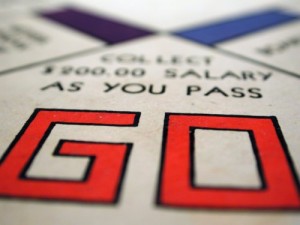
I recently played a marathon game of Monopoly (is there any other kind?) that brought back great memories. Monopoly was always my favorite game when I was a kid, and I truly loved the competitive, grind-it-out games that seemed to go on forever. Over the last couple decades, I haven’t had the chance to play the game very often (who has the time?), but long winter nights seem to be conducive to digging up the old Monopoly board.
Lady Luck: A Key Player in Monopoly
As a kid, I had always prided myself on my skill at Monopoly, meaning that I was apparently either dismissive or unaware of the critical role that luck (i.e., the roll of the dice) plays in how the game unfolds. As almost everyone knows, in the initial stage of each game, luck means landing on the preferred and still-unsold properties so you can buy them, and in the later phases, luck is being able to avoid the overly-developed properties of the other players that would bankrupt you if you landed on them.
In the course of this recent game, I found that my lack of good fortune had allowed me to acquire only one monopoly (or full set of properties) and very few other properties that could be traded. In this case, my monopoly was the “Reds,” comprising Kentucky, Indiana, and Illinois Avenues. (You remember the Reds, of course; they’re the properties located between Free Parking and the “Yellows,” AKA Atlantic and Ventnor Avenues, as well as Marvin Gardens. The Reds could perhaps be described as mediocre-to-good properties; they’re a couple steps above Mediterranean and Baltic, but they’re definitely not Park Place and Boardwalk, either.)
So, given that I had just one monopoly and not much else, while my fierce opponents each had several, I had low expectations for my likely success in the game. But here’s where things got interesting. Lady Luck played a critical role, as everyone kept landing on the three Reds. Again, and again, and again. This brought in the revenue necessary to finance a few houses, and then a few hotels. Soon after that, the game was basically over.
How did this happen? Each of my fellow players had been lucky enough to each land several monopolies, and I had only one. Yet, I won the game in a resounding way. Was it my legendary Monopoly prowess? My unparalleled negotiating skills? No, it was neither of these. It was pure luck, of course, and in this game, Lady Luck smiled on me.
Random Acts of Marketing: A Dangerous Path
Sometimes, success is just a case of being lucky. And that’s the point here. Because, while luck is great when you have it, it’s not a good thing to rely upon. And neither, of course, should anyone rely on anything that might be considered random – and definitely not in business. Which brings us to one of my often-heard warnings: Stay far away from Random Acts of Marketing.
Too many businesses (law firms and others) take a random stab in the dark when it comes to their marketing. In fact, frequently, it’s multiple, random stabs in the dark, one after the other. And these end up being neither positive in any brand-building sense nor productive in terms of bringing in new clients, eventually leading to a deeply held suspicion that all marketing is a waste of time and money.
But, you see, that’s the big difference between Random Acts of Kindness and Random Acts of Marketing. The first kind is good; if you participate in a Random Act of Kindness, chances are that you’re not spending much money and you’re not looking for a financial return on your investment (ROI). Whatever act of kindness you take on (e.g., paying for the coffee order of the guy behind you in line at Starbucks) is presumably its own reward.
On the other hand, participating in Random Acts of Marketing is the worst of both worlds. You may be putting significant resources into marketing, and you’re likely expecting a positive ROI, but because you’re acting in a random manner, you’re not likely to see much, if any, return.
Instead of veering from one marketing tactic to another without much forethought or insight, it’s essential to first determine if they’re truly right for your law practice. To do this, you need to understand if and how they might fit into your overall marketing strategy, and if so, you need to ensure that you already have your foundational, must-have marketing and branding in place. This is different for every business, but the foundational marketing typically includes one’s market positioning and marketing message, and the next priorities often include a focus on one’s website and search engine marketing. When it comes to marketing, you always want to know what you’re doing and why, and your chances of success will be much greater as long as you stay far from the Path of Randomness.
I may have won that recent game of Monopoly with just the Reds, but the odds would not be in my favor should I try it again with the same setup. And it’s the same thing with marketing: Sure, it’s possible that in the course of following one or more Random Acts of Marketing, you might get lucky. That is, if you were to randomly decide that 2015 is the year that you should focus on Marketing Tactic X or Y, it’s certainly possible that it could take off and provide you with more new clients than you could have imagined.
Thinking Strategically: Marketing That Makes Sense
But is that really how you want to go forward? Putting all your eggs in one basket (or even two), based upon what a colleague or neighbor or some article states is the one tactic or marketing channel where – they swear – everyone is finding unlimited success?
No, of course not. And that’s why even though there will always be stories of companies that have found impressive returns through X or Y, your best chance of success is to put the hard work into strategic marketing: determining who you are as a service provider, what makes you special in the marketplace, who your target market is, and why they should prefer you over your competitors. In other words, figuring out your Unique Lawyering Proposition. Once you have that down, you’re more than halfway to determining what your marketing plan should look like for the year ahead.
And with this strategic approach, you won’t have to hope that you get lucky, because you’ll be on your way to building a strong and sustainable Boardwalk Empire for the long term.


